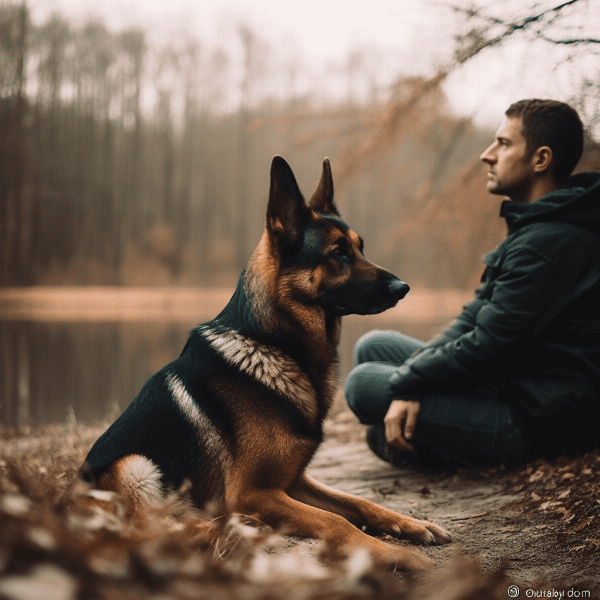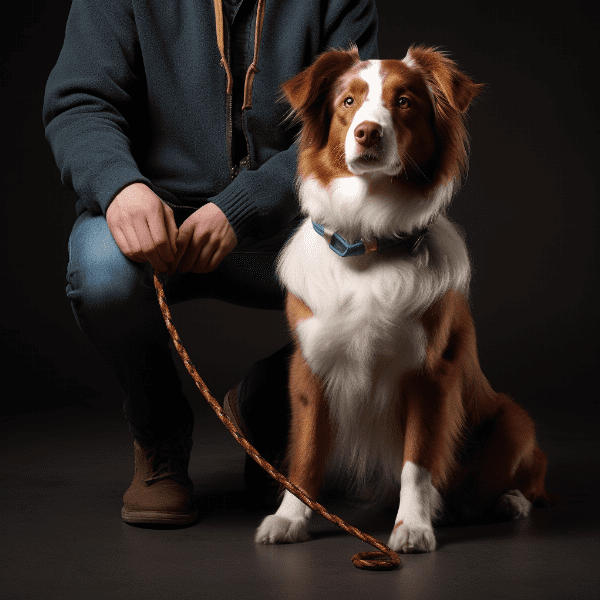Table of Contents
- Understanding Aggressive Behavior in German Shepherds
- Early Signs of Aggression in German Shepherds
- Avoiding Triggers: Identifying What Makes Your German Shepherd Aggressive
- Positive Reinforcement Training Techniques for Aggressive German Shepherds
- Seeking Professional Help: Finding a Qualified Dog Trainer or Behaviorist
- Management Strategies for Living with an Aggressive German Shepherd
- Incorporating Exercise and Playtime into Your German Shepherd’s Routine
- Providing a Safe and Secure Environment for Your Aggressive German Shepherd
- Understanding Legal Responsibilities for Owners of Aggressive Dogs
- Staying Calm and Patient: Managing Your Own Emotions When Dealing with an Aggressive German Shepherd.
Understanding Aggressive Behavior in German Shepherds
German Shepherds are a popular breed known for their loyalty, intelligence, and protective nature. However, as with any breed, some German Shepherds may exhibit aggressive behavior. Aggression in dogs can be caused by a variety of factors, including genetics, lack of socialization, fear, or a history of abuse or neglect. Understanding the underlying causes of your German Shepherd’s aggression is essential to finding the right solution and improving their behavior.
The Different Types of Aggression
It’s important to note that not all aggression is the same. There are several types of aggression that German Shepherds may exhibit, including:
- Territorial Aggression: This is when a German Shepherd becomes aggressive when someone or something enters their territory, such as their home or yard.
- Protective Aggression: Similar to territorial aggression, protective aggression occurs when a German Shepherd perceives a threat to their family or pack.
- Fear Aggression: Fear aggression happens when a German Shepherd reacts aggressively due to fear or anxiety, such as when they encounter unfamiliar people or animals.
- Possessive Aggression: This type of aggression occurs when a German Shepherd becomes aggressive when someone tries to take away their toys, food, or other possessions.
- Predatory Aggression: Predatory aggression is when a German Shepherd displays aggression towards other animals, such as chasing or attacking them.
Signs of Aggressive Behavior
German Shepherds are known for their intense and alert nature, but there are some behaviors that may indicate aggressive tendencies. Some signs to look out for include:
- Growling, barking, or snarling: These vocalizations may be a warning sign that your German Shepherd is feeling threatened or uncomfortable.
- Stiff body posture: If your German Shepherd’s body is tense and rigid, it may indicate that they are feeling defensive or aggressive.
- Showing teeth or biting: This is the most obvious sign of aggression and should not be ignored.
Addressing Aggressive Behavior
If your German Shepherd is exhibiting aggressive behavior, it’s important to address the issue as soon as possible. The first step is to identify the cause of the aggression, as this will determine the best course of action. In some cases, simple management techniques like avoiding triggers or keeping your dog on a leash may be enough to prevent aggressive behavior. For more severe cases, professional help from a qualified dog trainer or behaviorist may be necessary.
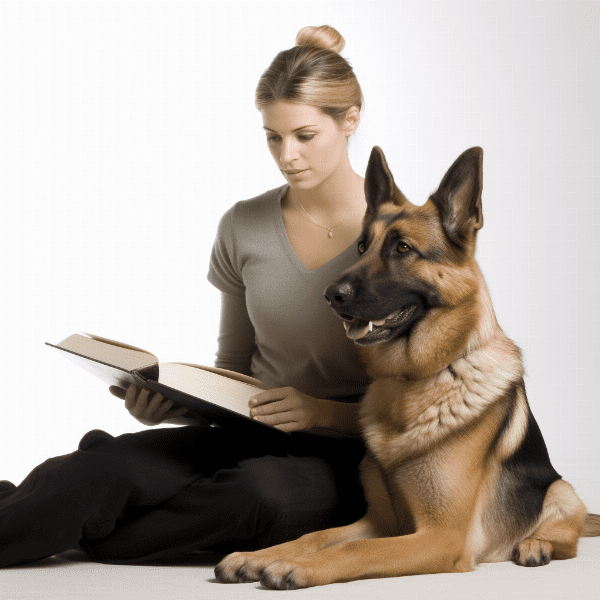
Early Signs of Aggression in German Shepherds
Recognizing the early signs of aggression in your German Shepherd is crucial to addressing the issue before it escalates. While some behaviors may be harmless, others may be a warning sign of future aggression. Here are some early signs of aggression to look out for:
Staring or Fixating
German Shepherds have an intense gaze and may fixate on people or animals they perceive as a threat. If your German Shepherd is staring or fixating on someone or something for an extended period, it may be a sign of aggression.
Growling or Snarling
Growling and snarling are vocalizations that German Shepherds may use to communicate their discomfort or aggression. While these vocalizations may be harmless in some situations, it’s important to pay attention to the context in which they occur.
Lip Curling or Showing Teeth
German Shepherds may curl their lips or show their teeth when they feel threatened or uncomfortable. This behavior may be accompanied by growling or other vocalizations.
Stiff Body Posture
When a German Shepherd is feeling aggressive, their body may become stiff and tense. This posture may be accompanied by other signs of aggression, such as growling or showing teeth.
Avoiding Eye Contact or Turning Away
While German Shepherds may stare or fixate on someone or something they perceive as a threat, they may also avoid eye contact or turn away when they feel uncomfortable or threatened.
Nipping or Biting
Nipping or biting is the most obvious sign of aggression and should not be ignored. German Shepherds may nip or bite as a warning sign or in self-defense, but it’s important to address this behavior as soon as possible to prevent it from escalating.
Addressing Early Signs of Aggression
If you notice any of these early signs of aggression in your German Shepherd, it’s important to address the issue as soon as possible. Ignoring these behaviors or dismissing them as harmless may lead to more severe aggression in the future. The first step is to identify the cause of the behavior and address it accordingly. In some cases, this may involve professional help from a qualified dog trainer or behaviorist.
Overall, recognizing the early signs of aggression in your German Shepherd is key to preventing and managing aggressive behavior. By addressing the issue as soon as possible and working to identify and address the underlying causes, you can help your German Shepherd become a happier, healthier, and more well-behaved member of your family.
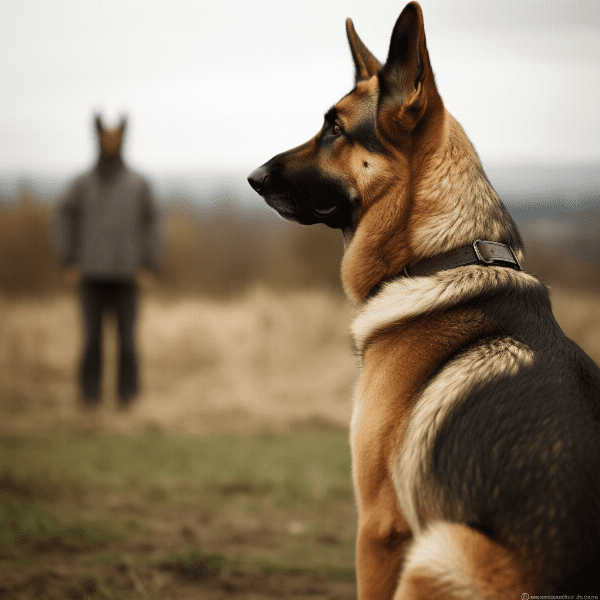
Avoiding Triggers: Identifying What Makes Your German Shepherd Aggressive
Identifying what triggers your German Shepherd’s aggressive behavior is a crucial step in managing their behavior. Aggression in dogs can be caused by a variety of factors, including fear, anxiety, and territoriality. Here are some tips for identifying what makes your German shepherd aggressive:
Keep a Record of Aggressive Episodes
Keeping a record of when and where your German Shepherd exhibits aggressive behavior can help you identify patterns and triggers. Note the time of day, location, and any other factors that may have contributed to the behavior. This record can be shared with a professional dog trainer or behaviorist to help identify the underlying causes of the aggression.
Watch for Body Language
German Shepherds communicate their emotions through their body language. Watching for signs of aggression, such as a stiff body posture or growling, can help you identify when your German Shepherd is feeling uncomfortable or threatened. If you notice any of these signs, remove your German Shepherd from the situation or take steps to calm them down.
Identify Specific Triggers
German Shepherds may have specific triggers that cause them to exhibit aggressive behavior. These triggers may include other dogs, strangers, or loud noises. Identifying these triggers and avoiding them can help prevent aggressive behavior. For example, if your German Shepherd becomes aggressive around other dogs, it may be necessary to keep them on a leash or avoid dog parks.
Consider the Environment
The environment in which your German Shepherd lives can also contribute to their aggressive behavior. Lack of socialization, a stressful living environment, or a lack of exercise and stimulation can all lead to aggressive behavior. Ensuring that your German Shepherd has plenty of socialization, exercise, and a comfortable living environment can help prevent aggression.
.
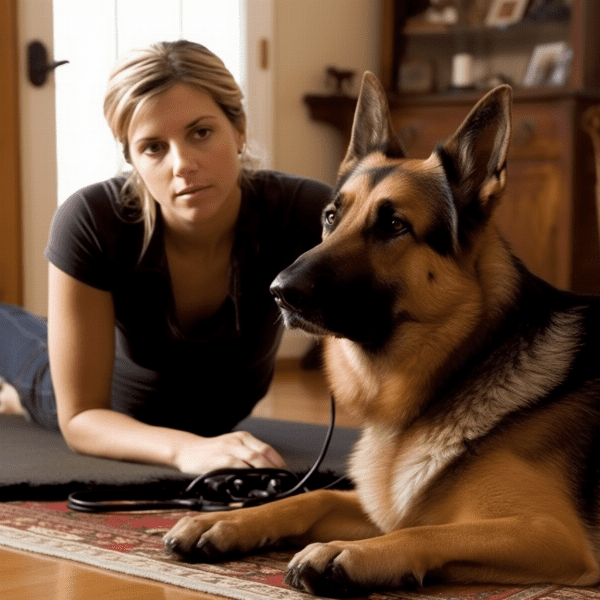
Positive Reinforcement Training Techniques for Aggressive German Shepherds
Positive reinforcement training is a highly effective method for managing aggressive behavior in German Shepherds. This approach focuses on rewarding good behavior rather than punishing bad behavior, which can lead to a happier, healthier, and more well-behaved dog. Here are some positive reinforcement training techniques that can be used to manage aggression in German Shepherds:
Counter-Conditioning
Counter-conditioning involves changing your German Shepherd’s emotional response to a specific trigger. For example, if your German Shepherd becomes aggressive around strangers, you can gradually expose them to strangers in a controlled environment and reward them for calm behavior. Over time, your German Shepherd will learn to associate strangers with positive experiences rather than aggression.
Desensitization
Desensitization involves gradually exposing your German Shepherd to a trigger that causes them to exhibit aggressive behavior. This can be done in a controlled environment with the help of a professional dog trainer or behaviorist. By gradually increasing exposure and rewarding calm behavior, your German Shepherd can learn to tolerate the trigger without becoming aggressive.
Clicker Training
Clicker training involves using a clicker to mark desired behavior and reward your German Shepherd with treats or praise. This method is highly effective for teaching new behaviors and reinforcing good behavior. For example, if your German Shepherd becomes aggressive when someone enters your home, you can teach them to go to their bed and stay there until released using clicker training.
Obedience Training
Obedience training can help establish a strong bond between you and your German Shepherd and improve their behavior. Teaching your German Shepherd basic obedience commands like sit, stay, and come can help you control their behavior in potentially stressful situations. By rewarding good behavior with treats or praise, you can encourage your German Shepherd to behave appropriately in all situations.
Avoid Punishment-Based Training
Punishment-based training methods, such as shock collars or physical punishment, can lead to increased aggression and damage the bond between you and your German Shepherd. These methods are not recommended for managing aggressive behavior and can lead to long-term negative effects.
Overall, positive reinforcement training is a highly effective method for managing aggressive behavior in German Shepherds. By using techniques like counter-conditioning, desensitization, clicker training, and obedience training, you can help your German Shepherd become a happier, healthier, and more well-behaved member of your family.
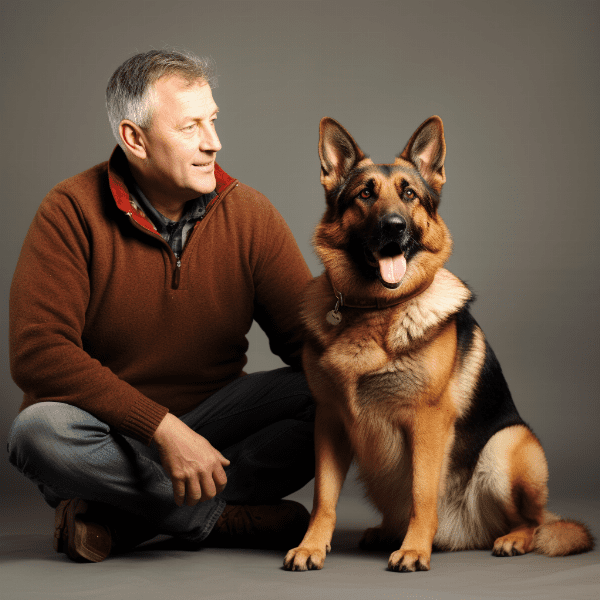
Seeking Professional Help: Finding a Qualified Dog Trainer or Behaviorist
Ask for Referrals
Ask your veterinarian, friends, or family members for referrals to qualified dog trainers or behaviorists in your area. They may have personal experience with a particular trainer or behaviorist and can provide valuable insights into their qualifications and methods.
Research Credentials and Experience
When considering a dog trainer or behaviorist, research their credentials and experience. Look for someone who has completed formal training in dog behavior and training and has experience working with aggressive dogs. You may also want to look for someone who is certified by a professional organization like the Certification Council for Professional Dog Trainers (CCPDT).
Schedule a Consultation
Before committing to a dog trainer or behaviorist, schedule a consultation to discuss your German Shepherd’s behavior and their methods for managing aggression. Ask questions about their approach, their qualifications, and their experience with similar cases. A good trainer or behaviorist will be happy to answer your questions and provide references if needed.
Consider the Cost
The cost of dog training or behavior modification can vary widely, so it’s important to consider your budget when selecting a trainer or behaviorist. Keep in mind that while cost is important, it should not be the only factor in your decision. A qualified and experienced trainer or behaviorist may be more expensive, but their expertise may be worth the investment.
Trust Your Instincts
Ultimately, it’s important to trust your instincts when selecting a dog trainer or behaviorist. If you feel uncomfortable with a particular trainer or behaviorist or their methods, it’s best to look elsewhere. You want to find someone who you feel confident in and who can provide the support you need to help your German Shepherd become a happier, healthier, and more well-behaved member of your family.
Overall, seeking professional help from a qualified dog trainer or behaviorist can be a highly effective way to manage aggressive behavior in German Shepherds. By asking for referrals, researching credentials and experience, scheduling a consultation, considering the cost, and trusting your instincts, you can find the right professional to help you and your German Shepherd.
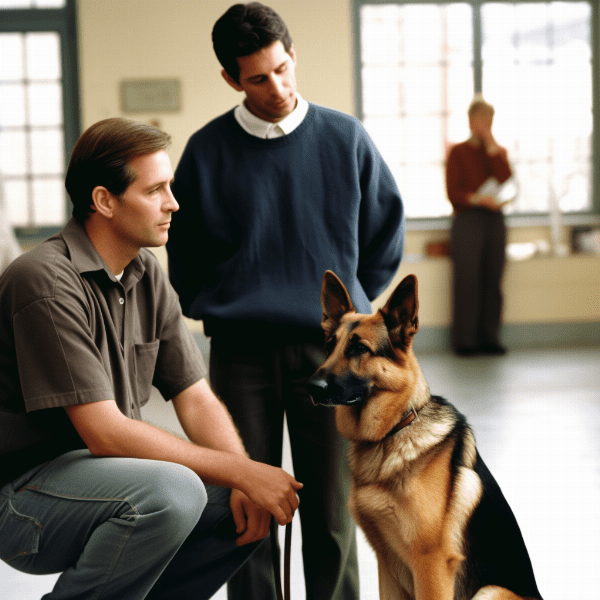
Management Strategies for Living with an Aggressive German Shepherd
Living with an aggressive German Shepherd can be challenging, but there are several management strategies that can help keep you and your dog safe. These strategies focus on preventing aggressive behavior and managing it when it occurs. Here are some management strategies for living with an aggressive German Shepherd:
Supervision and Control
It’s important to supervise and control your German Shepherd’s behavior at all times. This may involve keeping them on a leash when out in public or crating them when visitors come over. By keeping your German Shepherd under control, you can prevent them from exhibiting aggressive behavior and keep yourself and others safe.
Provide Adequate Exercise and Stimulation
German Shepherds are high-energy dogs that require plenty of exercise and stimulation. Providing your dog with adequate exercise and mental stimulation can help reduce stress and anxiety and prevent aggressive behavior. This may involve daily walks, playtime, or training sessions.
Use Positive Reinforcement Training
Positive reinforcement training can be used to reinforce good behavior and prevent aggressive behavior. This approach involves rewarding your German Shepherd for calm behavior and teaching them new behaviors to replace aggressive behavior. It’s important to avoid punishment-based training methods, as they can increase aggression and damage the bond between you and your dog.
Seek Professional Help
If your German Shepherd’s aggressive behavior is severe or you are having difficulty managing it, seeking professional help from a qualified dog trainer or behaviorist may be necessary. They can provide expert guidance and support to help manage your dog’s behavior and improve their overall well-being.
Overall, living with an aggressive German Shepherd can be challenging, but there are several management strategies that can help keep you and your dog safe. By supervising and controlling your dog’s behavior, avoiding triggers, providing adequate exercise and stimulation, using positive reinforcement training, and seeking professional help when necessary, you can help your German Shepherd become a happier, healthier, and more well-behaved member of your family.
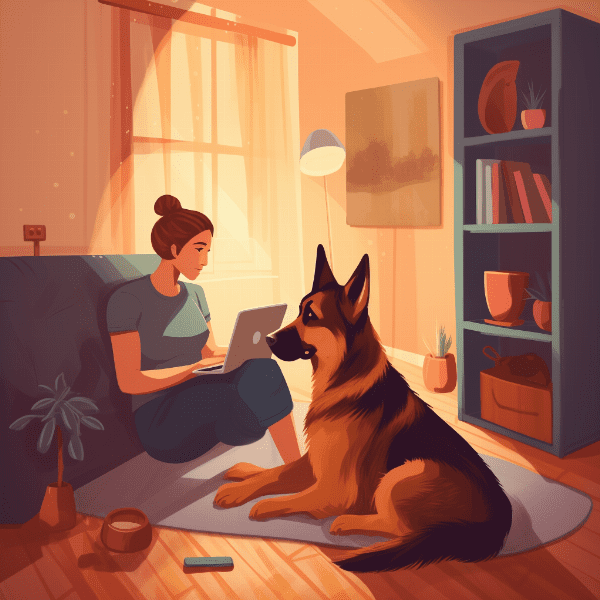
Incorporating Exercise and Playtime into Your German Shepherd’s Routine
Exercise and playtime are essential for the health and well-being of your German Shepherd, and can also help prevent aggressive behavior. Providing your dog with plenty of physical and mental stimulation can reduce stress and anxiety and promote good behavior. Here are some tips for incorporating exercise and playtime into your German Shepherd’s routine:
Daily Walks
Taking your German Shepherd for daily walks is essential for their physical and mental health. This provides them with an opportunity to explore their surroundings, socialize with other dogs, and get some much-needed exercise. A brisk 30-minute walk in the morning and evening can help reduce stress and anxiety and prevent boredom.
Playtime
Playing with your German Shepherd is a great way to provide mental and physical stimulation. This can include games like fetch, tug-of-war, or hide-and-seek. Providing your dog with interactive toys and puzzle feeders can also help keep them mentally stimulated.
Training Sessions
Training sessions can be a fun and engaging way to provide mental stimulation and prevent boredom. Teaching your German Shepherd new tricks or reinforcing basic obedience commands can help keep their mind active and reduce stress and anxiety. Using positive reinforcement training methods can also help improve your dog’s behavior and prevent aggression.
Swimming or Hiking
Swimming or hiking with your German Shepherd can provide them with an opportunity to explore new environments and get some much-needed exercise. Swimming is a great low-impact exercise that can be particularly beneficial for older dogs or those with joint issues. Hiking provides a great opportunity for your dog to explore new sights and smells and get some fresh air.
Dog Parks
Dog parks provide a great opportunity for your German Shepherd to socialize with other dogs and get some exercise. However, it’s important to supervise your dog at all times and make sure they are playing well with others. If your German Shepherd exhibits aggressive behavior at the dog park, it may be necessary to avoid this activity or work with a professional to address the behavior.
Overall, incorporating exercise and playtime into your German Shepherd’s routine is essential for their physical and mental health and can help prevent aggressive behavior. By providing daily walks, playtime, training sessions, swimming or hiking, and opportunities for socialization, you can help your German Shepherd become a happier, healthier, and more well-behaved member of your family.
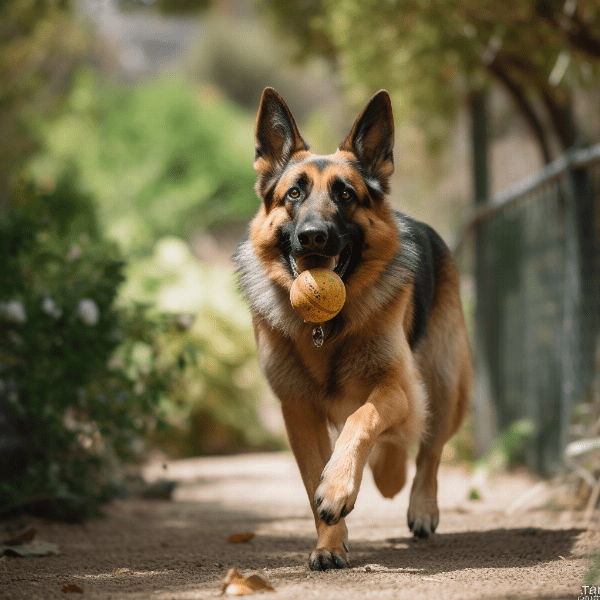
Providing a Safe and Secure Environment for Your Aggressive German Shepherd
Living with an aggressive German Shepherd can be challenging, but providing a safe and secure environment can help prevent aggressive behavior and keep both you and your dog safe. Here are some tips for providing a safe and secure environment for your aggressive German Shepherd:
Secure Your Home
Ensuring that your home is secure can prevent your German Shepherd from escaping and potentially becoming aggressive towards others. Make sure that all doors and windows are locked and that your dog is properly contained in a crate or behind a secure fence when outside.
Supervise Your Dog
Supervising your German Shepherd at all times is essential for preventing aggressive behavior. Keep your dog on a leash when out in public and never leave them unattended with children or other animals. If your German Shepherd exhibits aggressive behavior, it’s important to remove them from the situation and provide them with a calm and quiet space to retreat to.
Provide a Safe Space
Providing your German Shepherd with a safe space where they can retreat when feeling overwhelmed or anxious can prevent aggressive behavior. This may involve creating a comfortable crate or designated area in your home where your dog can relax and feel secure.
Use Safety Gear
Using safety gear, such as a muzzle or a head collar, can help prevent your German Shepherd from exhibiting aggressive behavior towards others. However, it’s important to only use these devices under the guidance of a qualified dog trainer or behaviorist.
Avoid Triggers
Identifying and avoiding triggers that cause your German Shepherd to exhibit aggressive behavior is essential for preventing dangerous situations. This may involve avoiding certain situations or people that trigger your dog’s aggression or making changes to your living environment to reduce stress and anxiety.

Understanding Legal Responsibilities for Owners of Aggressive Dogs
Owning an aggressive German Shepherd comes with legal responsibilities that owners must be aware of to avoid potential legal issues. Here are some things to keep in mind regarding legal responsibilities for owners of aggressive dogs:
Dog Bite Laws
Dog bite laws vary by state and locality, but most hold dog owners liable for any injuries their dog causes. This includes injuries caused by a dog bite or any other type of aggressive behavior. As a result, owners of aggressive dogs may face legal consequences and may be required to pay damages to the victim.
Breed-Specific Legislation
Some states and localities have enacted breed-specific legislation that prohibits or restricts ownership of certain breeds of dogs, including German Shepherds. It’s important to research the laws in your area to ensure that you are in compliance and to avoid potential legal issues.
Liability Insurance
Owners of aggressive dogs may be required to carry liability insurance to cover damages caused by their dog. This insurance can help protect owners from potential legal and financial consequences if their dog injures someone.
Responsible Ownership
Owners of aggressive dogs have a responsibility to ensure that their dog does not pose a danger to others. This includes providing adequate training, socialization, and supervision, as well as taking steps to prevent aggressive behavior. Failing to meet these responsibilities can result in legal consequences and may lead to the loss of ownership of the dog.
Reporting Aggressive Behavior
If your German Shepherd exhibits aggressive behavior towards others, it’s important to report the behavior to your local animal control agency. This can help prevent potential legal issues and may also result in professional help for your dog.
Overall, understanding legal responsibilities for owners of aggressive dogs is essential for preventing potential legal issues and ensuring the safety of others. By being aware of dog bite laws, breed-specific legislation, liability insurance, responsible ownership, and reporting aggressive behavior, owners of aggressive German Shepherds can help prevent legal issues and keep themselves and their dog safe.

Staying Calm and Patient: Managing Your Own Emotions When Dealing with an Aggressive German Shepherd.
Dealing with an aggressive German Shepherd can be stressful and emotionally challenging. It’s important to remember that your dog’s behavior is not personal and that with proper management and training, their behavior can improve. Here are some tips for staying calm and patient when dealing with an aggressive German Shepherd:
Take Deep Breaths
When you feel yourself becoming frustrated or overwhelmed, take a few deep breaths to help calm yourself down. Deep breathing can help reduce stress and anxiety and help you stay focused on managing your dog’s behavior.
Remain Calm
Your German Shepherd can sense your emotions, and if you become agitated or upset, it can escalate their aggressive behavior. Remaining calm and composed when dealing with your dog’s behavior can help prevent the situation from escalating and keep both you and your dog safe.
Practice Patience
Improving your German Shepherd’s behavior takes time and patience. It’s important to have realistic expectations and to celebrate small successes along the way. Practicing patience can help you stay committed to the training process and prevent frustration or burnout.
Seek Support
Dealing with an aggressive dog can be emotionally challenging, and it’s important to seek support when needed. This may involve reaching out to a support group or talking to a mental health professional. Taking care of your emotional well-being can help you stay focused and committed to your dog’s training and behavior management.
Celebrate Progress
When your German Shepherd makes progress in their behavior, celebrate their successes. This can help reinforce good behavior and remind you of the progress you and your dog are making together.
Overall, staying calm and patient when dealing with an aggressive German Shepherd is essential for managing their behavior and keeping both you and your dog safe. By taking deep breaths, remaining calm, practicing patience, seeking support, and celebrating progress, you can help your German Shepherd become a happier, healthier, and more well-behaved member of your family.
